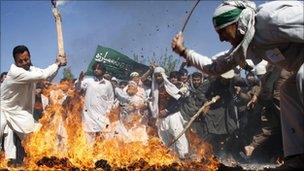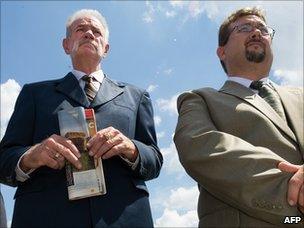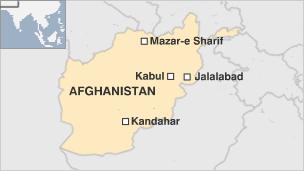Afghanistan: Koran protests in Kandahar and Jalalabad
- Published

Demonstrators in Jalalabad chanted anti-American slogans and burned an effigy of President Obama
At least one person has been killed and 18 injured in a third day of protests in Afghanistan over the burning of a Koran in the US last month.
Hundreds of demonstrators marched in Kandahar, Jalalabad and other areas on Sunday.
On Friday, 14 people, including seven UN staff, were killed in Mazar-e Sharif after similar protests.
US President Barack Obama described the killings as "outrageous" and the Koran burning as "intolerance and bigotry".
Afghan President Hamid Karzai has called on the US Congress to condemn the Koran burning and prevent it from happening again.
A statement from his office said Mr Karzai made the request at a meeting with Gen David Petraeus, the commander of international forces in Afghanistan.
Ten people in Kandahar died and dozens were injured following Saturday's protests.
Protests spread
On Sunday, demonstrators in Kandahar city - the birthplace of the Taliban - marched on the main UN office.
At least one person was killed when a gas canister exploded in Kandahar.
Interior ministry spokesman Zemarai Bashary said the canister was in a traffic police booth which was set alight by protesters, the AFP news agency reported.
Smaller protests were also reported in two other districts of Kandahar province, and in Parwan province, north of the capital, Kabul.
There are conflicting reports that at least one other person may have been killed, but it is not clear at which protest. At least 18 people were injured.
In the eastern city of Jalalabad, hundreds of demonstrators peacefully blocked a main road for three hours on Sunday.
The crowd shouted for US troops to leave Afghanistan and burnt an effigy of Mr Obama, according to an Associated Press photographer at the scene.
The UN's chief envoy to Afghanistan, Staffan de Mistura, blamed Friday's violence in the northern city of Mazar-e Sharif on the Florida pastor who burnt the Koran on 20 March.
"I don't think we should be blaming any Afghan," Mr de Mistura said. "We should be blaming the person who produced the news - the one who burned the Koran. Freedom of speech does not mean freedom from offending culture, religion, traditions."

Pastor Terry Jones (L) said and Wayne Sapp (R) did not feel responsible for the attack on the UN
He said the UN would temporarily redeploy 11 staff members to Kabul while their office in Mazar-e Sharif was rebuilt but there would be no evacuation.
In a statement published on Saturday evening, Mr Obama extended his condolences to the families of those killed by the protesters in Afghanistan.
"The desecration of any holy text, including the Koran, is an act of extreme intolerance and bigotry," he said. "However, to attack and kill innocent people in response is outrageous, and an affront to human decency and dignity."
Regional police commander Dawood Dawood told the BBC that the UN guards killed on Friday had not reacted quickly enough.
"They didn't fire when they should have. But they also didn't allow the Afghan National Police to guard the UN building from the inside," he said.
Condemnation
The controversy began in Florida on 20 March, when Pastor Wayne Sapp soaked a Koran in kerosene, staged a "trial" during which the Islamic holy book was found guilty of "crimes against humanity", and then set it alight.
The incident took place under the supervision of Pastor Terry Jones, who last year drew condemnation over his aborted plan to burn copies of the Koran on the anniversary of the 11 September 2001 attacks on the US.

The authorities in both Kandahar and Mazar-e Sharif have blamed the Taliban for the violence. However, the Taliban has rejected the accusation.
Pastor Jones has said that the Dove World Outreach Center's congregation does not "feel responsible" for the attack.
The protests began in Mazar-e Sharif on Friday, when protesters marched on the UN compound.
Several demonstrators were killed by guards at the compound, who were then overpowered by the mob.
Munir Ahmad Farhad, a spokesman for the governor of Balkh province, said the group seized weapons from the guards and stormed the building. Four Nepalese guards, a Norwegian, a Romanian and a Swede were killed.
- Published2 April 2011
- Published7 September 2010
- Published1 April 2011
- Published11 September 2010
- Published10 September 2010